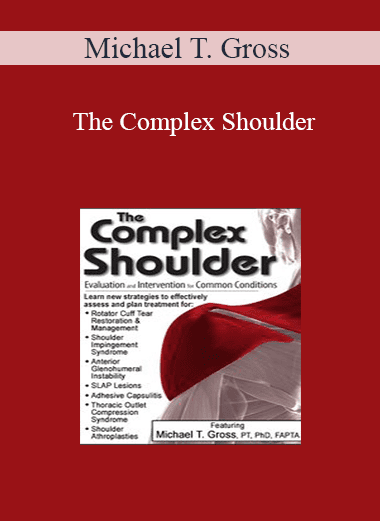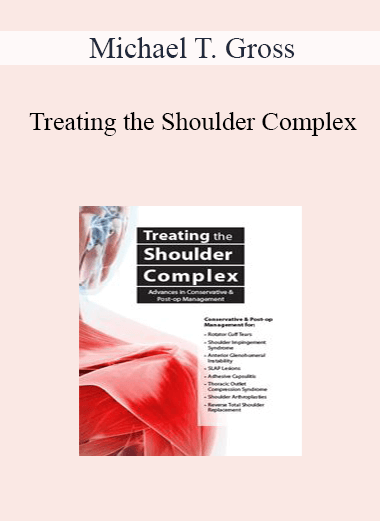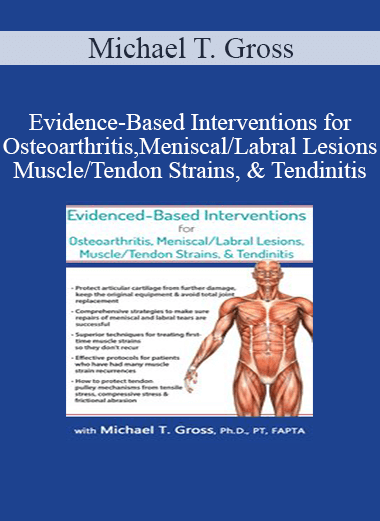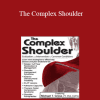Michael T. Gross – The Complex Shoulder: Evaluation & Intervention for Common Conditions
$219.99 Original price was: $219.99.$43.00Current price is: $43.00.
[Instant Download] – You will receive instant download access after the purchase
- Faculty:
- Michael T. Gross
- Duration:
- Full Day
- Format:
- Audio and Video
- Copyright:
- Oct 21, 2016
Description
Join expert Michael T. Gross, PT, PhD, FAPTA, for an information-packed day focused on giving you the tools you need to overcome the sometimes difficult task of intervening for shoulder injuries. Learn new strategies to assess and plan treatment effectively for:
- Rotator Cuff Tear Restoration & Management
- Shoulder Impingement Syndrome
- Anterior Glenohumeral Instability
- SLAP Lesions
- Adhesive Capsulitis
- Thoracic Outlet Compression Syndrome
- Shoulder Arthroplasties
Learn more than just the etiology of these common shoulder complex pathologies. Learn how to interpret clinical tests and recognize the patient’s problem quickly. Rapid recognition is imperative not only in developing the appropriate course of action for the patient, but also ensuring the patient has the best chance for a successful rehabilitation. Acquire take-home tips and techniques that will change your clinical practice the very next day!
Handouts
| Webcast Manual (9.08 MB) | 97 Pages | Available after Purchase |
Outline
Rotator Cuff Tears
- Surgical restoration of normal and altered anatomy
- Cluster tests, modified empty can test
- Anatomic repair vs. “the best you can do”
- Conservative management
- Post-operative management
Shoulder Impingement Syndrome
- Anatomic and functional contributors
- Cluster tests, modified Hawkins-Kennedy, modification of Neer’s test
- Surgical repair procedures for primary impingement
- Conservative management based on etiologic factors
- Post-operative management
Anterior Glenohumeral Instability
- Anatomic restraints
- Etiologic factors
- Apprehension, Jobe Relocation, Release Test, Anterior Drawer, Push-Pull
- Anatomic Repair, Bristow, Laterjat, Putti-Platt
- Rehabilitative management
SLAP Lesions
- Classification of lesions
- Biceps Load II, Anterior Slide Test
- Surgical management and rehabilitation based on lesion type
Adhesive Capsulitis
- Stages based on symptoms
- Etiologic factors
- Effects of conservative versus invasive intervention
- Conservative management based on stage of disorder
- Anterior, Posterior, Inferior Glenohumeral Mobilizations and Scauplo-thoracic Mobilizations
Thoracic Outlet Compression Syndrome
- Anatomic locations of potential compromise
- Etiologic factors in each anatomic location
- Intervention based on location of compromise and etiologic contributors
- Assessment Tests: Adson’s, Military Bracing, Hyperabduction
- Surgical Procedures: Cervical Rib Excision, Scalenectomy
Shoulder Arthroplasties
- Indications for
- Hemi-arthroplasty
- Total shoulder arthroplasty
- Reverse total shoulder arthroplasty
- Outcomes
- Rehabilitation strategies
Review of Special Tests and Mobilizations – Lab
Faculty
Michael T. Gross, PH.D., PT, FAPTA Related seminars and products: 4
Michael T. Gross, PhD, PT, FAPTA, has 37 years of experience as a licensed physical therapist, specializing in the areas of biomechanics and orthopaedic assessment and treatment. He has maintained a consistent clinical practice for all of these years, currently seeing patients 2 days per week at his faculty practice.
He is a professor in the PhD Program in Human Movement Science, and the Doctorate of Physical Therapy (DPT) program in the Division of Physical Therapy at the University of North Carolina at Chapel Hill. Dr. Gross has 70 refereed journal publications in such journals as the Journal of Orthopaedic and Sports Physical Therapy, Physical Therapy, and the Journal of Manual and Manipulative Therapy. He was an Editorial Review Board Member for the Journal of Orthopaedic and Sports Physical Therapy and serves as a reviewer for many other journals. Dr. Gross was awarded the Teaching Excellence Award from the University of North Carolina at Chapel Hill School of Medicine and the Margaret L. Moore Award for Outstanding New Academic Faculty by the American Physical Therapy Association.
He also was elected as a Fellow of the American Physical Therapy Association. He has given well over 300 regional, national, and international presentations, which have been highly rated by attendees for knowledge, skill, and humor.
Speaker Disclosures:
Financial: Michael Gross is a Professor, Division of Physical Therapy, at the University of North Carolina – Chapel Hill. He receives a speaking honorarium from PESI, Inc.
Nonfinancial: Michael Gross has no relevant nonfinancial relationship to disclose.
Delivery Method
– After your purchase, you’ll see a View your orders link which goes to the Downloads page. Here, you can download all the files associated with your order.
– Downloads are available once your payment is confirmed, we’ll also send you a download notification email separate from any transaction notification emails you receive from IMC.sale.
– Since it is a digital copy, our suggestion is to download and save it to your hard drive. In case the link is broken for any reason, please contact us and we will resend the new download link.
– If you cannot find the download link, please don’t worry about that. We will update and notify you as soon as possible at 8:00 AM – 8:00 PM (UTC+8).
Thank You For Shopping With Us!
Be the first to review “Michael T. Gross – The Complex Shoulder: Evaluation & Intervention for Common Conditions” Cancel reply
Related Products
Medical & Health
Medical & Health
Medical & Health
Michael T. Gross – Treating the Shoulder Complex: Advances in Conservative & Post-Op Management
Medical & Health

![[Audio Download] BT16 Master Class 02 - Brief Therapy: Experiential Approaches Combining Gestalt and Hypnosis (II) - Jeffrey Zeig](https://imc.sale/wp-content/uploads/2022/02/Audio-Only-BT16-Master-Class-02-Brief-Therapy-Experiential-Approaches-Combining-Gestalt-and-Hypnosis-II-Jeffrey-Zeig-PhD-and-Erving-Polster-PhD-100x100.png)


![[Download Now] The Complex Shoulder: Evaluation & Intervention for Common Conditions – Michael T. Gross](https://imc.sale/wp-content/uploads/2022/02/Michael-T.-Gross-The-Complex-Shoulder-Evaluation-Intervention-for-Common-Conditions.jpg)
![[Download Now] Treating the Shoulder Complex: Advances in Conservative & Post-op Management – Michael T. Gross](https://imc.sale/wp-content/uploads/2022/02/Treating-the-Shoulder-Complex-Advances-in-Conservative-Post-op-Management-–-Michael-T.-Gross.jpg)



6 reviews for Michael T. Gross – The Complex Shoulder: Evaluation & Intervention for Common Conditions
There are no reviews yet.